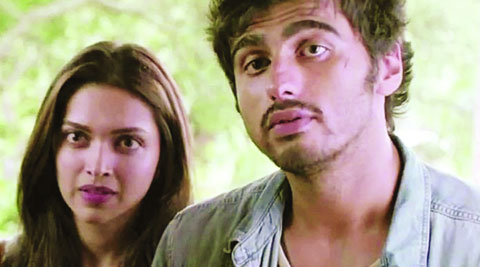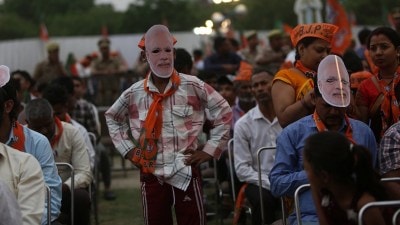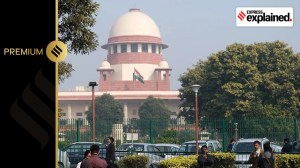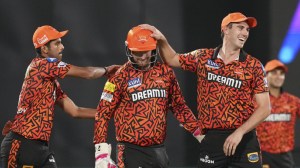- India
- International
English Vinglish
As Finding Fanny releases in both Hindi and English in September, top lining mainstream actors, Screen explores how the Indian market for such films has evolved
 A still of Finding Fanny
A still of Finding Fanny
By Priyanka Bhadani
A look at Homi Adajania’s next, Finding Fanny, whose trailer was launched recently, one can make out that the actors are true to their characters. Both the lead actors — Deepika Padukone (Fanny Fernandes) and Arjun Kapoor (Savio Da Gama) live their Goan characters as they deliver dialogues in English.
Owing to the off-beat theme, director Homi Adajania had to wait for a long time after writing the script as casting for the film became an issue. Deepika became interested in the story and came on-board and soon Arjun too gave a nod. Now that the film is in its post-production stage and set to release in September in both Hindi as well as in English, with all the right buzz around it, owing to the interesting posters and trailer (within days of releasing, the trailer got over three million views), Finding Fanny hardly seems like an off-beat film.
Is it the magic of the actors, who are synonymous with mainstream cinema? Or, is the audience really changing and lapping up films which have mixed languages and off-beat themes?
Film-maker Kaizad Gustad, who was probably one of the first directors in India to have experimented with an English language film (Bombay Boys) in the mid-nineties after people like Aparna Sen (36 Chowringhee Lane) and Dev Benegal (English August), recalls how when he was running around with an English script to different people in the film industry, and nobody took him seriously. “That was the pre-multiplex era when you had to make films for 1300 seaters and the industry knew that not much will come back,” remarks Gustad, who thinks that the multiplexes have changed the whole scenario for film-makers. “Today, a film can be made even for 300 seaters,” says Gustad while adding that the change has come not just for cinemas made in English but also for independent films.
Yusuf Shaikh, Business Head- Film Distribution, Acquisition and IPR management at Percept Picture Company, agrees and says that the number of outlets to show such films have grown in the past couple of years, making for a good business proposition of such films. “I remember how English, August just released in one theatre like Regal cinema, or the 2004 release, King of Bollywood released only in Sterling. If these films release today, they would get more space and thus better business, like the recent ones in the same category have got,” he remarks.
Another main reasons for the mass Indian audience to open up to characters who speak a language other than Hindi, Gustad thinks, is their exposure to content from across the world. “Accessing world cinema has become easier in the present time. An American movie is released on the same day in India as in the US. When the channels of accessing content from across the world grows, you also become receptive,” he remarks.
Filmmaker Piyush Jha, whose film King of Bollywood, again an English language film, hit the theatres in 2004, says that it wasn’t really difficult to get producers even then. “But people were a little resistant to come out and watch the film but now they have become more open to that idea.”
Agrees film-maker Ritesh Batra, whose main character, Saajan in his debut feature film, The Lunchbox thought in English. “It made sense then that he even expressed in English. However, it was just in the voice-overs that Irrfan’s character thought in English, but when it came to talking to other characters like Shaikh (Nawazuddin Siddiqui), he spoke in Hindi,” says Batra. He thinks that for a creative person like him, the business aspect comes much later, it is the authenticity of the character that matters more.
And even as he says that, Batra’s film has become a sleeper hit as the total worldwide earning till date is close to Rs. 85 crore.
Interestingly, in the recent past, many other Indian films which have been made in English have raked in the moolah. The 2011 release, Delhi Belly, a dark comedy directed by Abhinay Deo and starring Imran Khan, Vir Das and Kunaal Roy Kapur, was released both in Hindi as well as in English, keeping in mind its urbane significance as the film is set in Delhi. The film was declared a super hit raking in Rs. `92 crore worldwide. The film’s original screenplay clubbed with great performance and direction, was praised by critics all across.
Last year’s independent film, Ship of Theseus directed by newbie Anand Gandhi, surprised many when despite of its unusual theme and being a non-Hindi film (the film had characters not just speaking in English but also in Arabic, Gujarati etc), did well. Surprisingly, the film’s second week collection was more than the first. Initially released in just 23 screens across Mumbai, Delhi NCR, Bangalore, Hyderabad, Kolkata and Pune, it was also released in more screens once the word-of-mouth became stronger. “The response has paved the way for opening the film in more cities. On August 2, Ship of Theseus opens in Jaipur, Surat, Goa, Rajkot, Mangalore, Mysore, Chandigarh, Lucknow, Bhopal, Indore, Nagpur, Raipur, Vishakapatnam, Coimbatore, Patna, Calicut and Trivandrum,” wrote Dearcinema.com, a website catering to independent films, after the completion of two weeks of the film in theatres.
Ruchi Bhimani, the executive producer of Ship of Theseus, says that the director was very particular that the characters were convincing and they never really thought about the film’s target audience or the market it would cater to. “It was the film and the content that mattered to us,” she says.
Having said that, Bhimani remarks how having an English and a Hindi version for experimental films like the upcoming Finding Fanny, which has managed to get mainstream actors, makes a lot of sense. She thinks that the business prospect grows manifold. “A lot of Hindi-speaking audience would go to watch Finding Fanny just for the stars, while the English version would be watched by people who love to take away characters,” she says.
While business hardly matters to Batra, he doesn’t mince words while mentioning that his film got a good response from places like Ludhiana, Ajmer and Budhwar. “The penetration of English in India has become pretty wide and it is just a matter of time that such experimental films will be acknowledged even in the smaller towns and cities,” he says.
Nandu Ahuja, Sr. VP, India theatrical, Eros International Media Limited, has a better way to put it when he talks about how when Hindi films started having English titles, it was a big thing. But it soon became a trend and people got used to it. Now, English titles don’t surprise us,” he says adding, “Similar is the case with the content in the movies. A movie like Zindagi Na Milegi Dobara that was an urbane film, meant for the younger urban audience, did well across the country, despite prominent use of English dialogues in conversations.”
However, these are just baby steps towards better cinema as not all the films made in English are lapped up by the audience. Indie-film-maker Sandeep Mohan’s Love Wrinkle Free, a 2011 release, wasn’t that successful. “It got token release in 17-20 screens across India and hardly came in the public eye,” says the film-maker, who thinks that in the last two-three years things have changed and the audience has evolved. There is openness about the quality and the type of cinema that we consume.
However, Gustad says that it doesn’t mean that we will see a surge of English films being made. “In the independent arena such films are being made since a long time. To take it out commercially and make it a success is a difficult thing to accomplish even now. Once that happens, it would be an achievement,” he concludes.
Some of the critically acclaimed Indian English films over the years:
* 36, Chowrangee Lane – Aparna Sen
* English August – Dev Benegal
* Bombay Boys – Kaizad Gustad
* Mr & Mrs Iyer – Aparna Sen
* The King of Bollywood – Piyush Jha
* Delhi Belly – Abhinay Deo
* The Lunchbox – Ritesh Batra
* Ship of Theseus – Anand Gandhi
Photos
Apr 25: Latest News
- 01
- 02
- 03
- 04
- 05









































